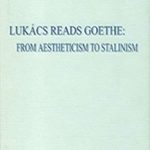 Lukács Reads Goethe: From Aestheticism to Stalinism. Columbia, SC: Camden House, 1997.
Lukács Reads Goethe: From Aestheticism to Stalinism. Columbia, SC: Camden House, 1997.
Long recognized as one of the foremost literary critics of the twentieth century, the Hungarian-born Georg Lukács (1885-1971) shocked many by turning to Marxism in 1918. Having adopted German as his language of choice, he used his formidable knowledge of European cultural history to revitalize Marxist theory with History and Class Consciousness (1923), and continued to write extensively about literature. His essays on Goethe and Thomas Mann are particularly well known. Even now, discussions about the novel, realism, and literary theory are incomplete without references to his work. The ultimate question posed by Vazsonyi’s book is how Lukács in the 1930s was able to write enthusiastically about Goethe, citing him as an ideal exponent of humanism, while simultaneously accepting, even condoning Stalinism.
